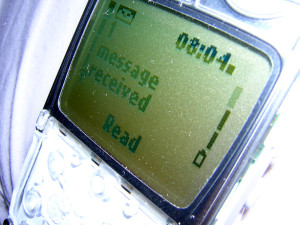August 24, 2018

On July 26, 2018, a Telephone Consumer Protection Act (“TCPA”) class action lawsuit was filed by Plaintiff Derrick Thomas (“Thomas”) in the United States District Court for the Southern District of Florida against Defendant Peterson’s Harley Davidson of Miami, LLC (“Peterson’s”). In his TCPA case, Thomas alleges that Peterson’s sent five promotional text messages to his cellular telephone number, using an automatic telephone dialing system (“ATDS”), without his prior consent. Thomas also alleges that, upon information and belief, Peterson’s sent text messages “en masse” to the cellular telephone numbers of thousands of other consumers. Accordingly, Thomas brought the suit on his own behalf and on behalf of all others similarly situated, seeking to certify the following class:
| All persons who, on or after four years prior to the filing of the initial complaint in this action, (1) were sent a text message to their cellular telephone number by or on behalf of Peterson’s, (2) using an automatic telephone dialing system, (3) for the purpose of soliciting their purchase of Peterson’s products, and (4) from whom Peterson’s (a) does not allege to have consent, or (b) alleges to have obtained consent in the same manner it alleges to have obtained consent from Plaintiff. |
Peterson’s moved to dismiss the TCPA case or for a more definite statement with respect to Thomas’s allegations. Thomas has not yet filed his opposition to the dismissal motion.
Why did Peterson’s Move to Dismiss the TCPA Case or for a More Definite Statement?
The TCPA prohibits the making of any call, including the sending of any text message, using an ATDS, to any telephone number assigned to a cellular telephone service, without the receiving party’s prior express written consent. 47 U.S.C. § 227(b)(1)(A)(iii). The TCPA defines an ATDS as “equipment which has the capacity (A) to store or produce telephone numbers to be called, using a random or sequential number generator; and (B) to dial such numbers.” 47 U.S.C. § 227(a)(1).
In moving to dismiss, Peterson’s’ fundamental contention was that Thomas failed to plead sufficient underlying facts that were within his personal knowledge, rendering his claims implausible. Pursuant to the seminal U.S. Supreme Court case of Ashcroft v. Iqbal, 556 U.S. 662 (2009), a plaintiff must set forth plausible factual allegations from which a court can draw the reasonable inference that the defendant is liable for the misconduct alleged. Peterson’s asserted that Thomas’s complaint failed the Iqbal plausibility test in three primary respects: (i) that Thomas failed to disclose the telephone number to which the alleged text messages were sent; (ii) that Thomas failed to allege a sufficient factual basis upon which the Court could infer that an ATDS was employed in sending the subject text messages; and (iii) that Thomas’s allegation that thousands of other consumers were also texted by Peterson’s without their consent similarly lacked a sufficient factual basis to support it.
Peterson’s contended that without disclosing Thomas’s telephone number, 1) the Court could not infer that Thomas, in fact, received the subject text messages, and 2) Peterson’s could not investigate the merit of his claims and respond accordingly. With respect to the ATDS allegations, Peterson’s asserted that they were merely speculative and conclusive deductions of fact, not facts themselves. As to the class allegations, Peterson’s contended that Thomas did not set forth the basis for his “information and belief” that Peterson’s also sent text messages to thousands of other consumers. As an alternative to dismissal of the complaint, Peterson’s asked the Court to direct Thomas to replead his complaint with more definite statements of fact.
As we have previously blogged, defendants routinely challenge the sufficiency of pleadings on a myriad of issues presented in TCPA cases. There are numerous pleading requirements, as well as statutory and regulatory elements to TCPA claims that must be satisfied, that often serve as useful tools in defending against such suits. In this rapidly-evolving area of telemarketing law, if you are a party to a TCPA case, it is critical to retain experienced TCPA litigation counsel.
If you are interested in learning more about this topic or are a party to a TCPA lawsuit, please e-mail us at info@kleinmoynihan.com or call us at (212) 246-0900.
The material contained herein is provided for information purposes only and is not legal advice, nor is it a substitute for obtaining legal advice from an attorney. Each situation is unique, and you should not act or rely on any information contained herein without seeking the advice of an experienced attorney.
Attorney Advertising
Related Blog Posts:
Second Circuit follows DC Circuit’s reasoning in vacating FCC’s interpretation of an autodialer
GoDaddy did not use an autodialer: TCPA case dismissed



